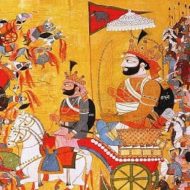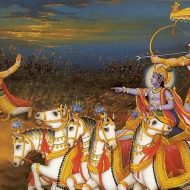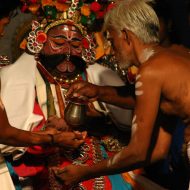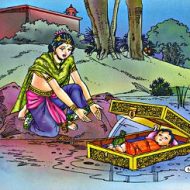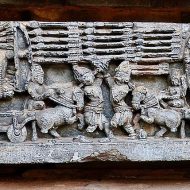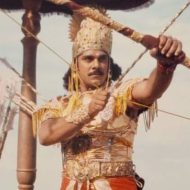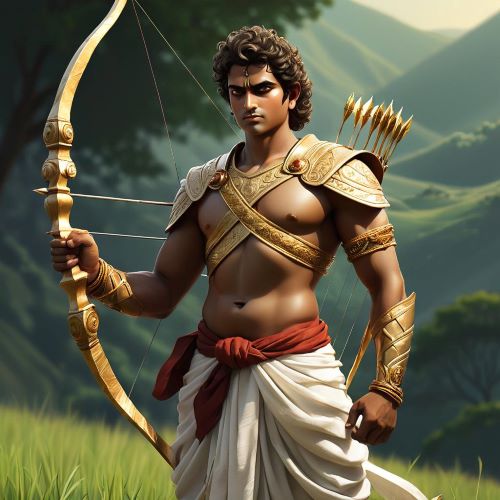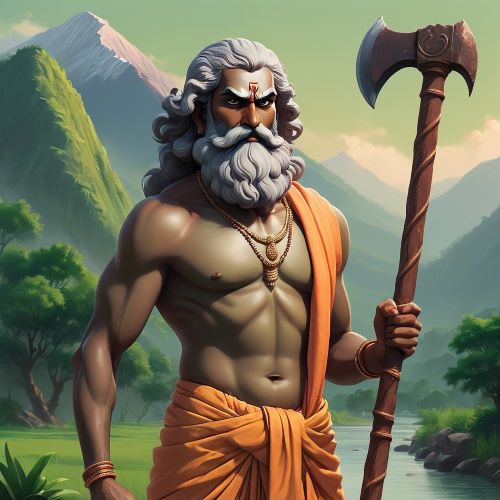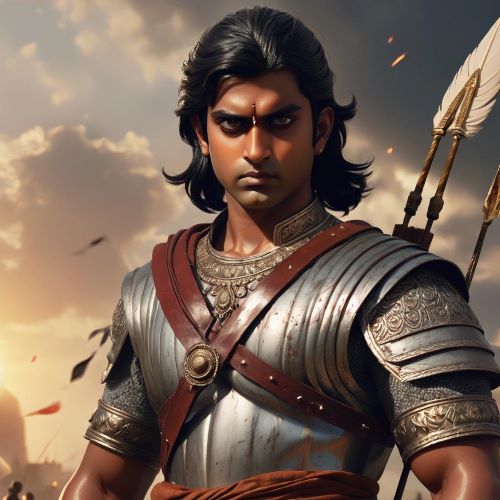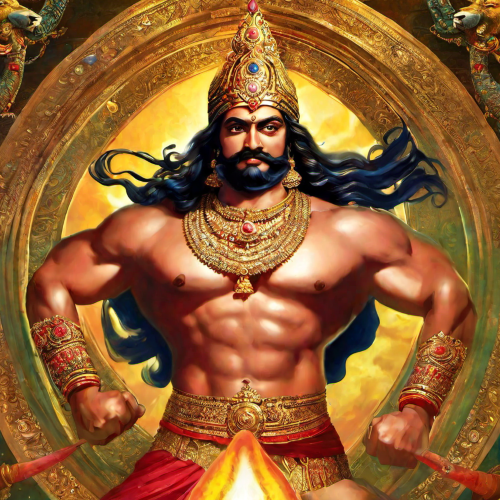Karna : The Cursed Warrior
Listen
At a glance
| Description | |
|---|---|
| Origin | Indian Mythology |
| Classification | Demigods |
| Family Members | Surya (Father), Kunti (Mother), Pandavas (Brothers) |
| Region | India |
| Associated With | Warfare, Sun, Archery |
Karna
Introduction
Karna is one of the most important characters who play a key role in the Hindu epic poem, Mahabharata. Although growing up as a child who did not know his parents, Karna becomes an accomplished warrior and a gifted speaker. He eventually became the king of Anga, a region in Bengal, under Duryodhana and joined the forces of Duryodhana during the Kurukshetra war. He was supposed to kill the third Pandava Arjuna, but he eventually died in battle with him.
In the Mahabharata, Karna is shown to be a flawed but good man. After meeting his biological mother, he learns that his sworn enemies are his half-brothers but decides to continue being a loyal friend to Duryodhana. The character of Karna is a symbol of a man who is rejected by those who should love him but finds respect and love from the very people he should have stood against. Despite his shortcomings, he still manages to become a role model to many around him.
His character is often developed to raise and discuss major moral and ethical dilemmas. His story has inspired various works of Hindu literature, both in India and southeast Asia.
Physical Traits
Karna was often depicted with a golden glow representing the sun who was his father. He was born with magical armour and earrings which protected him from harm and physical danger.
Family
According to a legend, a king from the Yadava dynasty named Shurasena had a beautiful daughter named Pritha or Kunti. A scholar named Durvasa visited the king and asked to stay at his palace. He was impressed by the king’s hospitality and provided Pritha with the Siddha mantra to help her with her future child. After leaving, Durvasa thanked her and told her that if she ever wanted to have a child, she could ask any deity to provide her with a child.
When Pritha, a teenager, started to doubt the effectiveness of the mantra and she initiated it one morning. Through this, she was able to invoke the divine God Surya to provide her with a son. The sun god Surya appeared and gave her a son.
Pritha was ashamed of herself and worried that everyone would think that she had given birth out of wedlock. According to Vedic culture, having children before one is married is considered immoral. She then put her new-born son in a basket and floated it in the Ashvanadi river. The basket floats on and eventually reaches the Ganges River and then makes its way to the ancient Bengal kingdom of Anga. The basket was found by, a charioteer’s wife named Radha who takes the infant to her husband, Adhiratha. They immediately adopted him and named him Vasushena.
Karna was also half brothers with the 5 Pandavas and the closest friend to Duryodhana and Ashwathama.
Other Names
Karna was also called with many names. Some of them are: Vasusena – Original name of Karna, means “born with wealth” as he was born with natural armour and earrings also known as the ‘kavacha’ and ‘kundala’. Suryaputra meaning son of Surya and Radheya which meant son of Radha who was Karna’s adopted mother were names given on the basis of his parentage. He was also called Sutaputra meaning son of charioteer and this was used in a derogatory manner. Other names which highlighted his vitus include Angaraja or king of Anga, Daanaveera which meant the one who has undying charitable nature or one who is exceptionally generous and Vijayadhari or holder of a bow named Vijaya which was gifted by Lord Parashurama.
Powers and Abilities
Karna was considered to be an extremely gifted warrior and an equal to Arjuna with the bow and arrow. He was also an expert charioteer and was in possession of numerous divine and celestial weapons which he could conjure at will.
Unfortunately Karna was cursed twice in his life whereby he was condemned to die when he was most vulnerable and not in a position to defend himself. The second curse also ensured that at the time he most needed it, his memory would fail and he will not be able to use any of his skills or remember the incantations of any of his divine weaponry. This ultimately lead to his death during the battle against the Pandavas.
Modern Day Influence
Karna has been a popular character amongst writers, moviemakers and other socio cultural commentators as his life was an amazing paradox that people have tried to explain and recreate in various art forms over the years.
Related Images
Frequently Asked Questions
What is lorem Ipsum?
I am text block. Click edit button to change this text. Lorem ipsum dolor sit amet, consectetur adipiscing elit. Ut elit tellus, luctus nec ullamcorper mattis, pulvinar dapibus leo.
What is lorem Ipsum?
I am text block. Click edit button to change this text. Lorem ipsum dolor sit amet, consectetur adipiscing elit. Ut elit tellus, luctus nec ullamcorper mattis, pulvinar dapibus leo.
What is lorem Ipsum?
I am text block. Click edit button to change this text. Lorem ipsum dolor sit amet, consectetur adipiscing elit. Ut elit tellus, luctus nec ullamcorper mattis, pulvinar dapibus leo.
What is lorem Ipsum?
I am text block. Click edit button to change this text. Lorem ipsum dolor sit amet, consectetur adipiscing elit. Ut elit tellus, luctus nec ullamcorper mattis, pulvinar dapibus leo.
What is lorem Ipsum?
I am text block. Click edit button to change this text. Lorem ipsum dolor sit amet, consectetur adipiscing elit. Ut elit tellus, luctus nec ullamcorper mattis, pulvinar dapibus leo.

